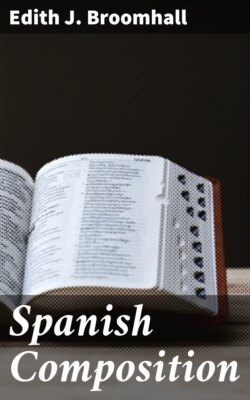Читать книгу Spanish Composition - Edith J. Broomhall - Страница 5
На сайте Литреса книга снята с продажи.
LESSON I
ОглавлениеÍndice
| El trabajo es buen compañero de la esperanza. [1] |
| —MARTÍNEZ SIERRA. |
1. English to be is generally translated into Spanish by ser or estar, the former with the general idea of permanency, the latter indicating temporary state. Location is always expressed by estar.
I, who was white, am also brown, because the sun has kissed me.
Yo, que era blanca, estoy también morena, porque el sol me ha besado.—MARTÍNEZ SIERRA.
(a) In expressions referring to the weather to be is rendered by hacer, to make, the descriptive adjective becoming in Spanish a noun of corresponding meaning.
It was suffocatingly hot.
Hacía un calor sofocante.—PALACIO VALDÉS.
It was very cold in the city to-day.
Hacía mucho frío hoy en la ciudad.
Note.—In all such expressions very must be translated mucho, since calor, frío, etc., are nouns.
(b) When used with a predicate adjective indicating mental or physical state, to be is translated by tener, the adjective changing to a noun of corresponding meaning.
The commonest of these expressions are to be hungry, thirsty, hot, cold, sleepy, afraid, right, careful, jealous, which are rendered tener hambre, sed, calor, frío, sueño, miedo, razón, cuidado, celos.
Uncle is right. That can't hurt him.
Tiene razón el tío. Eso no puede hacerle mal.—RAMOS CARRIÓN.
While I am so cold I don't want to go out.
Mientras tengo tanto frío no quiero salir.
I wasn't hungry but I was very sleepy.
No tenía hambre pero tenía mucho sueño.
Note.—In all similar expressions so is rendered tanto. Cf. note to (a) above.
(c) Many phrases consisting of the verb to be and an adjective denoting age or dimension are translated by tener and a noun. Such are to be old, wide, long, high, etc., rendered tener edad, anchura, longitud, altitud. Note also to be to blame, one's fault, tener la culpa; to be successful, tener éxito.
How old are these children?
¿Qué edad tienen estos niños?
The ribbon is two inches wide.
La cinta tiene dos pulgadas de anchura.
(d) To be at meaning to attend is translated asistir a.
There were not many at the meeting last night.
No asistían muchos a la reunión de anoche.
(e) To be worth is translated valer. To be worth while is valer la pena.
I don't know how much it is and it isn't worth while to ask.
No sé cuanto vale y no vale la pena de preguntar.
2. EXERCISES
(a) 1. Hacía tanto calor que no podíamos dormir aunque teníamos mucho sueño. 2. Ya no tenemos miedo de nada. 3. Dice que tiene mucho frío. 4. Nos preguntaron si teníamos hambre. 5. Usted cree que este hombre tiene razón. Pues yo creo que no la tiene. 6. La mesa tiene cuatro pies de longitud y tres de anchura. 7. Yo no tengo la culpa de que no asistieron al teatro anoche. 8. Dígale que tendré mucho gusto en aceptar su amable invitación y asistir al concierto. 9. Ha hecho tanto frío hoy como si fuéramos en el mes de diciembre. 10. Estoy seguro de que usted tendrá mucho éxito.
(b) 1. Don't be afraid of the dog. He will not bite you. 2. How wide is this river? 3. If you are so hungry, why don't you eat? 4. Is it my fault that they are not here yet? 5. It is too cold in this room. Close the door. 6. The living-room is longer than the dining-room, but it is not so wide. 7. I don't feel like (am not desirous of) studying to-night. 8. I wasn't at school the day that the President visited it. 9. I gave him the money although I knew that the thing wasn't worth it. 10. It is cool to-day. It was so warm yesterday.
